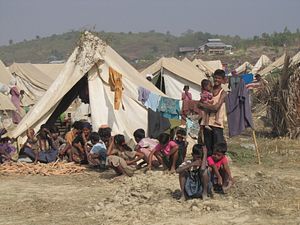Malaysia is aiming to reach the top tier of the United States’ world-renowned human trafficking report by 2020, the country’s deputy prime minister said yesterday.
As I reported back in July, Malaysia was controversially upgraded from the bottom (Tier 3) of the U.S. State Department’s Trafficking in Persons (TIP) report to the Tier 2 Watch List – meant for governments making significant efforts to bring themselves into compliance with the standards (See: “US Upgrades Malaysia in Trafficking Report: Boost for TPP, Blow to Rights?”). That removed a key obstacle to Malaysia being part of the Trans-Pacific Partnership (TPP), leading some to question whether the State Department had watered down the report for strategic reasons in a blow to rights.
Following the upgrade, both the United States and Malaysia have been working to make improvements on the issue ahead of next year’s report, and officials have privately acknowledged that significant challenges remain (See: “Exclusive: US, Malaysia and the War Against the Islamic State”). But at a high-level committee meeting under the Home Ministry’s Anti-Human Trafficking Council (Mapo) this week, Deputy Prime Minister Ahmad Zahid Hamidi, who is also home minister, told reporters that Malaysia was aiming for the top tier of the TIP report by 2020.
“By 2020, we aim to achieve Tier One based on the criteria set by the United States,” Zahid said according to the Malaysian daily The Sun.
That’s quite a tall order given where Malaysia is now – a point Zahid himself acknowledged when he said much work remained to be done. But he also cited ongoing efforts to address specific problems listed in the report. For example, on allowing human trafficking victims to work in the country, Zahid said some 2,217 would be eligible to do so. Some of the job opportunities, he said, were being created for victims by way of the U.S. embassy in Malaysia, which had secured 30 job openings at the JW Marriott Hotel.
“It’s good to see senior ministers here and I would like to convey Washington’s appreciation for the meeting,” Joseph Yun, the U.S. ambassador to Malaysia, said at the meeting. “We worked on this project for some time with the Malaysian government and we hope that this project could be expended.”
Measures in some of the other areas being addressed remain less clear. For example, Zahid said the Home Ministry and Human Resources Ministry would come up with a new definition for what constitutes a “human trafficking victim” as the current definition given by the United States was “too wide.” Without further details, that seems more like a redefinition of a problem rather than working towards a solution.
Addressing the issue of the mass graves of 106 bodies found on the border with Thailand earlier in May – believed to be mainly Rohingya victims of human traffickers – Zahid said that the police had identified six people responsible, five of them Thais and one from Myanmar. He also added that some 67 investigations had been carried out to find all parties responsible. The key will be whether those found guilty will eventually be successfully prosecuted, as that is another key metric in the report.
“We want to tell the international community that our commitment is clear and we will ask Thailand to help us prosecute those people here in Malaysia,” Zahid said.
“This will put to rest international allegations that we are not doing our work to address the issue.”

































